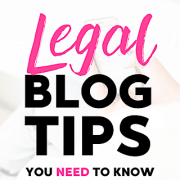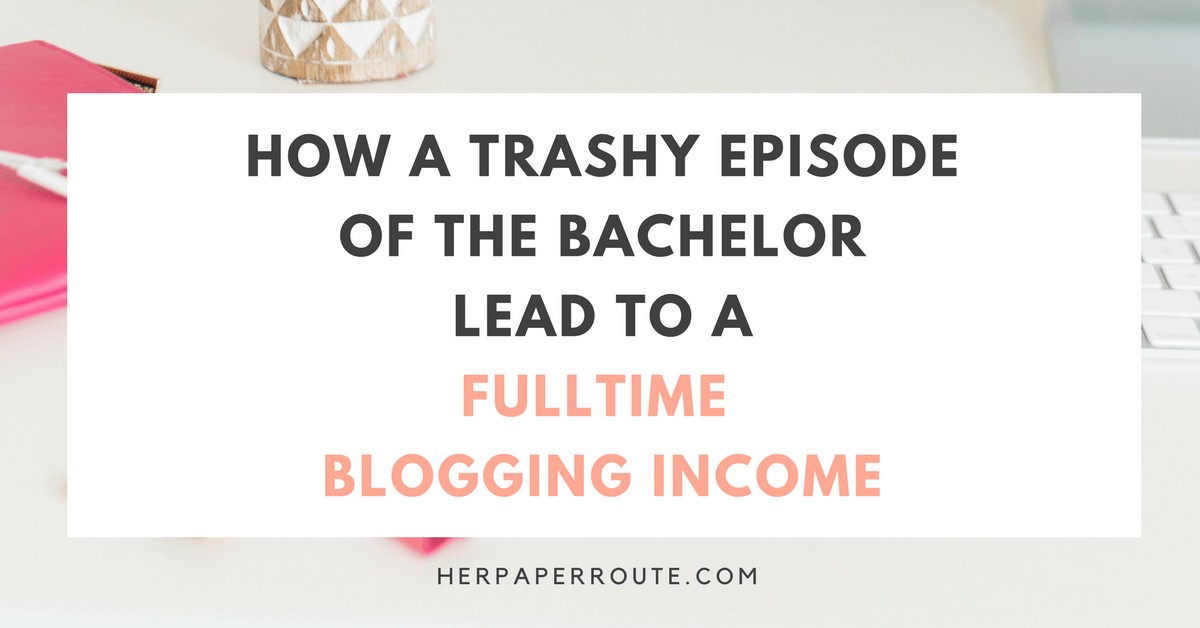5 Legal Tips For Bloggers From A Lawyer: Protect Your Blog
Legal Tips For Bloggers From A Lawyer: This is a topic I get asked about a lot. How do you blog legally? What information is needed for a blog privacy policy? How do you disclose affiliate links on your blog, legally?
I am so excited to introduce you to today’s guest writer, Amira. She is a lawyer who helps bloggers understand the legal side of running an online business, so we can all legally blog with confidence.
She has some seriously must-know legal tips for bloggers here.
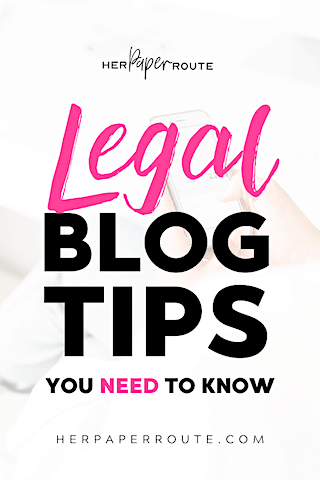
Legal Tips For Bloggers
Before we get started with Amira’s Legal Tips For Bloggers, let’s talk blogging, first.
As an affiliate partner of various brands and sponsored content, HerPaperRoute may earn commission on qualifying purchases. Disclaimer | Advertise With Us
If you haven’t yet started or monetized your blog yet, enroll in my money-making bloggers startup course for FREE right now. We cover everything you need to start a professional blog as a business.
As well, I welcome you to join the HerPaperRoute community. You can sign up below.
When you become a HerPaperRoute member today, I will send you instant access to The HerPaperRoute Profitable Entrepreneur + Blogging Toolkit, a FREE resource library of tools to help your business thrive!
Plus, you will get my weekly update with oh-so-good blogging, social media, and money-making business tips that you can’t get anywhere else. Don’t worry you will NEVER get spam or useless crap from me.
Join here:
5 Legal Tips For Bloggers From A Lawyer
Hi guys! I’m Amira. Thank you, Chelsea for providing me the opportunity to write this guest post and help our fellow bloggers with the legal side of their online business.
I’m a lawyer but I’m also a blogger and in my blogging journey, I often see many bloggers confused, intimidated and overwhelmed about how to blog legally.
Legal tips for bloggers: There’s a lot to learn, so I’m going to share some important legal tips and guidelines that all bloggers must follow to protect their online business and stay out of legal trouble.
Here’s my Legal Disclaimer before we get started:
Although I am a lawyer by profession, I am not YOUR lawyer. This article is for informational and educational purposes only, does not constitute legal advice and does not establish any kind of attorney-client relationship with me. I am not liable or responsible for any damages resulting from or related to your use of this information.
Legal Tips For Bloggers From A Lawyer: Privacy Policy, Terms + Disclosure Page Templates
Amira has put together the most thorough and comprehensive legal privacy policy, disclosure, and terms and conditions pages templates for bloggers.
You can grab the individual ones you need below, or save big and get the bundle of all 3. I have the bundle of all 3 and I can’t recommend it enough. This is a must for all bloggers.
Legal Templates For Your Website
Disclaimer Template | Privacy Policy Template | Terms & Conditions Template
Or, save money and get the Legal Bundle For Your Website which is all 3 templates + bonuses!
Bonus: Listen To Amira On The HerPaperRoute Podcast
In addition to this blog post, I interviewed Amira on my podcast to chat more about the legal information that all website owners need to be aware of. Listen to her interview here!
What Do You Need To Know About Copyright Law?
In the U.S., copyright law is a form of intellectual property law that protects your original work of authorship from the moment it is created.
You get automatic copyright protection of your work from the time you create it, meaning you don’t have to formally register your copyright to receive this protection.
Copyright law protects your tangible work such as blog posts, photos, images, music, books, movies, art, etc so someone cannot make copies of your work or use it without your permission.
The purpose of this law is to protect your hard work, time and effort you put into creating the work and then securing your rights to profit from it.
This is great for bloggers because imagine spending hours writing a blog post only to find it on someone else’s blog the next day?
This happens more frequently than you can imagine but fortunately, the copyright law allows you to take legal action against the offender who stole your content and sue that person for money and other damages.
If someone copies your content, the first tool available to you is called a Digital Millennium Copyright Act takedown notice (DMCA notice) that you can send to a service provider of the offender requesting to remove that content.
A service provider could be a search engine such as Google, web-hosting company like Bluehost, social media company like Facebook, or basically anywhere else where the copyright infringement took place.
In my experience, I have seen bloggers being sued for thousands of dollars just for taking a single photo from Google and posting it on their blog.
Don’t be one of those bloggers to make this mistake because once again, those are someone else’s copyrighted images. You do not have permission to use them.
So the moral of the story is that as a blogger, DO NOT use anyone’s content without their permission, whether that’s a photo, blog post, legal pages, product or anything else because a single copyright violation can result in serious criminal and civil penalties for you.
Read more about Copyright rules for bloggers <- that link includes what to do if you find that someone has stolen your blog content. A must read!
What Do You Need To Know About Email Marketing And The Can-spam Act?
In the U.S., the CAN-SPAM Act governs your email marketing rules.
The purpose of this law, just like the name sounds, is to prevent spam emails!
Almost all bloggers use some sort of email marketing service (ConvertKit, MailChimp, etc) to collect and send emails to the users of their website.
But before you start emailing your subscribers, you must understand the laws regarding email marketing to ensure you are complying with them.
Even a simple violation like failing to include your postal address in your email marketing can result in fines of up to $16,000!
Under the CAN-SPAM Act, you must include a valid postal address in your emails (this could be a PO Box address if you are not comfortable disclosing your physical home address for instance).
Most bloggers work from home so obviously, they want to protect their privacy and don’t want to disclose their home address in these emails.
Therefore, having a PO Box address is a great alternative.
Note: If you are a ConvertKit customer, you can use their company address as your address. Just one of the reasons ConvertKit is awesome! Find out more here.
There are additional steps you need to take to comply with the CAN-SPAM Act, such as:
- Having permission to email the people on your list
- Providing a way to unsubscribe or opt-out of receiving future emails from you
- Honoring unsubscribe requests within 10 business days
- Having accurate non-deceptive email headers, domain names and subject lines
- And disclosing if your message is an advertisement
Remember that even when you use an email marketing company like ConvertKit or any other, you are still ultimately responsible for ensuring that your emails comply with the CAN-SPAM Act.
Otherwise, you could face huge civil and criminal penalties for these violations as well.
Do You Need A Privacy Policy On Your Blog?
Just like the CAN-SPAM Act is put in place to prevent spam emails, there are additional laws that you need to comply with when you collect someone’s personal information (name, email address, credit card information, etc) on your website.
The law requires you to have a Privacy Policy on your blog, which is a legal document or page on your website stating how you collect, use and disclose your visitor’s personal information.
The purpose is to protect the privacy of the visitors and users of your website.
Your Privacy Policy covers the email marketing rules we discussed above under the CAN-SPAM Act:
- Ensuring your compliance with them
- Your compliance with the General Data Protection Regulation (GDPR)
- Children’s privacy
- Cookies and comment policies
- And many other important legal provisions to protect you from breaking the laws.
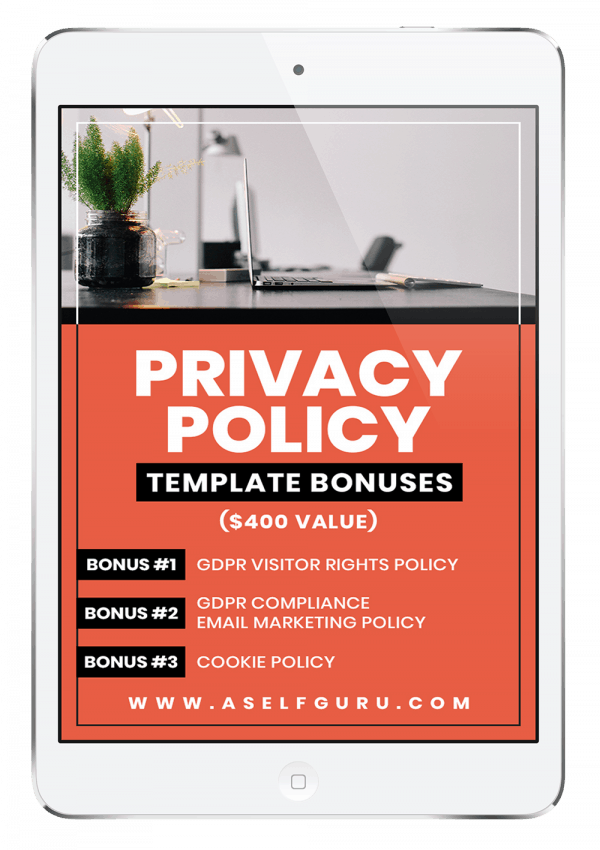
If you don’t have a Privacy Policy on your blog then look into the template I’ve personally drafted here, which has helped tons of bloggers become compliant with the law including GDPR compliance.
As a blogger myself, my Privacy Policy template comes with additional bonuses that are not available in other templates.
You would have to pay additional to get these bonuses but I’ve included them for free.
Do You Need A Terms And Conditions Page On Your Blog?
We talked about copyright protection above but have you wondered where you spell out your intellectual property rights on your blog?
In the terms and conditions of your website! Think of these as your website rules, and they are also known as “Terms of Use”, or “Terms of Service.”
All bloggers must have them because they serve as a legal contract between you and the users of your website.
For example, if you are selling any kind of products or services on your website, you want your buyers to know what your refund or exchange policies are, so that there’s no such legal dispute down the road.
A lot of bloggers neglect this aspect of their business but you should not make that legal mistake!
You should always protect yourself legally by ensuring that your buyers accept your terms and conditions before purchasing your products or services.
Otherwise, if you get sued for something, you won’t have a valid legal defense.
Additionally, your website’s terms and conditions also cover other important things like your governing law provisions, reservation of your rights, lawful use of your website, your right to terminate someone’s use of your website, etc.
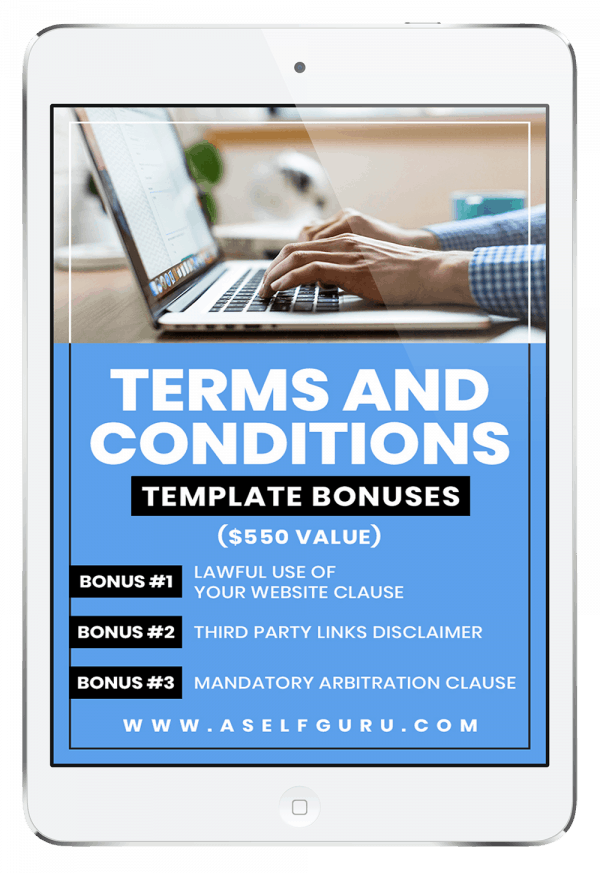
If you want a professionally written Terms And Conditions page on your blog then look into my Terms and Conditions template that I’ve personally drafted.
It is part of the discounted Legal Bundle I sell, which includes ALL three legal pages you need on your blog.
Do You Need Disclosures And Disclaimers On Your Blog?
First, you need to understand the difference between a disclosure and a disclaimer, and yes, you need both on your blog for different reasons!
A disclosure informs your readers about your relationship with third parties such as the products and brands you promote on your blog in exchange for any kind of compensation (money or free products for example).
The most common examples include your affiliate relationships and sponsored posts.
Almost all bloggers are affiliates of some products and they write about those products on their website.
Then when someone purchases that particular product from your affiliate link, you receive a commission. But the law requires you to disclose such affiliate relationships properly.
Under the Federal Trade Commission (FTC), you are required to disclose to your readers that you will be compensated if someone purchases a product through your affiliate link.
The purpose behind FTC regulating this is to ensure honest truthful advertising, so consumers are not misguided and can make well-informed decisions.
The FTC regularly conducts audits and monitors whether you are properly disclosing your affiliate relationships or not.
[adsense]See some examples here where the FTC sent 90 letters to influencers and marketers on Instagram reminding them to clearly disclose their affiliate relationships.
You definitely don’t want to be one of those bloggers to get in legal trouble with the FTC for not complying with the laws.
Same thing with sponsored posts, you must disclose to your readers that you were paid to write that blog post.
So please make sure to have proper Disclosures and Disclaimers on your website from the beginning!
Now let’s talk briefly about Disclaimers because this is where the legalese comes in.
A good Disclaimer drafted by a lawyer will protect you from all kinds of legal liability.
There’s lots of special language that needs to be included in the Disclaimer that serves to protect you and your business in the event of a lawsuit.
So even if you publish something inaccurate or write something that could get you in trouble, a proper Disclaimer on your website can still protect you in court to shift legal liability to the other person.
But if you don’t even have a disclaimer then you are out of luck!
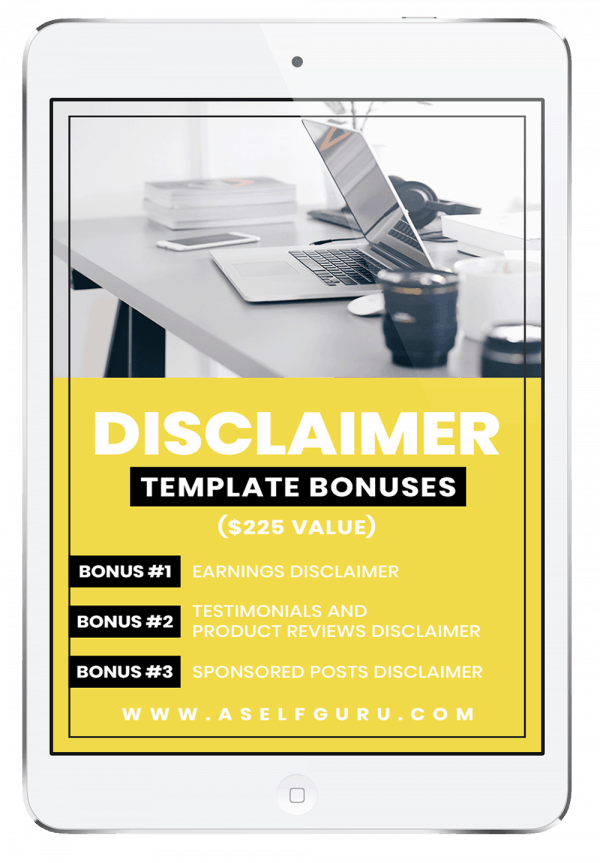
You have now not only exposed yourself to legal liability for your errors but also for the errors of the affiliate partners/products you write about on your blog.
Here’s a Disclaimer template I drafted that has helped tons of bloggers already with their blog!
I also included the common affiliate disclosures such as your specific Amazon affiliate disclosure language you need on your website along with other affiliate disclosures.
My Disclaimer template also comes with three additional bonuses such as a sponsored post, earnings and testimonials disclaimer that you must have if you publish any of those on your blog.
How To Make Your Blog Legally Compliant
Before you launch your blog, make it your priority to take the appropriate steps to ensure your blog is legal and that you are complying with all the laws we already discussed above.
The easiest way to legally protect your blog is by having a lawyer drafted legal pages on your website that are comprehensive enough to cover all your bases.
I’ve reviewed and drafted HUNDREDS (I’m pretty sure, it’s in the thousands but whose counting!) of legal policies in my career working as a full-time lawyer, and I’ve also conducted tons of legal audits for seasoned bloggers to make them compliant with the law.
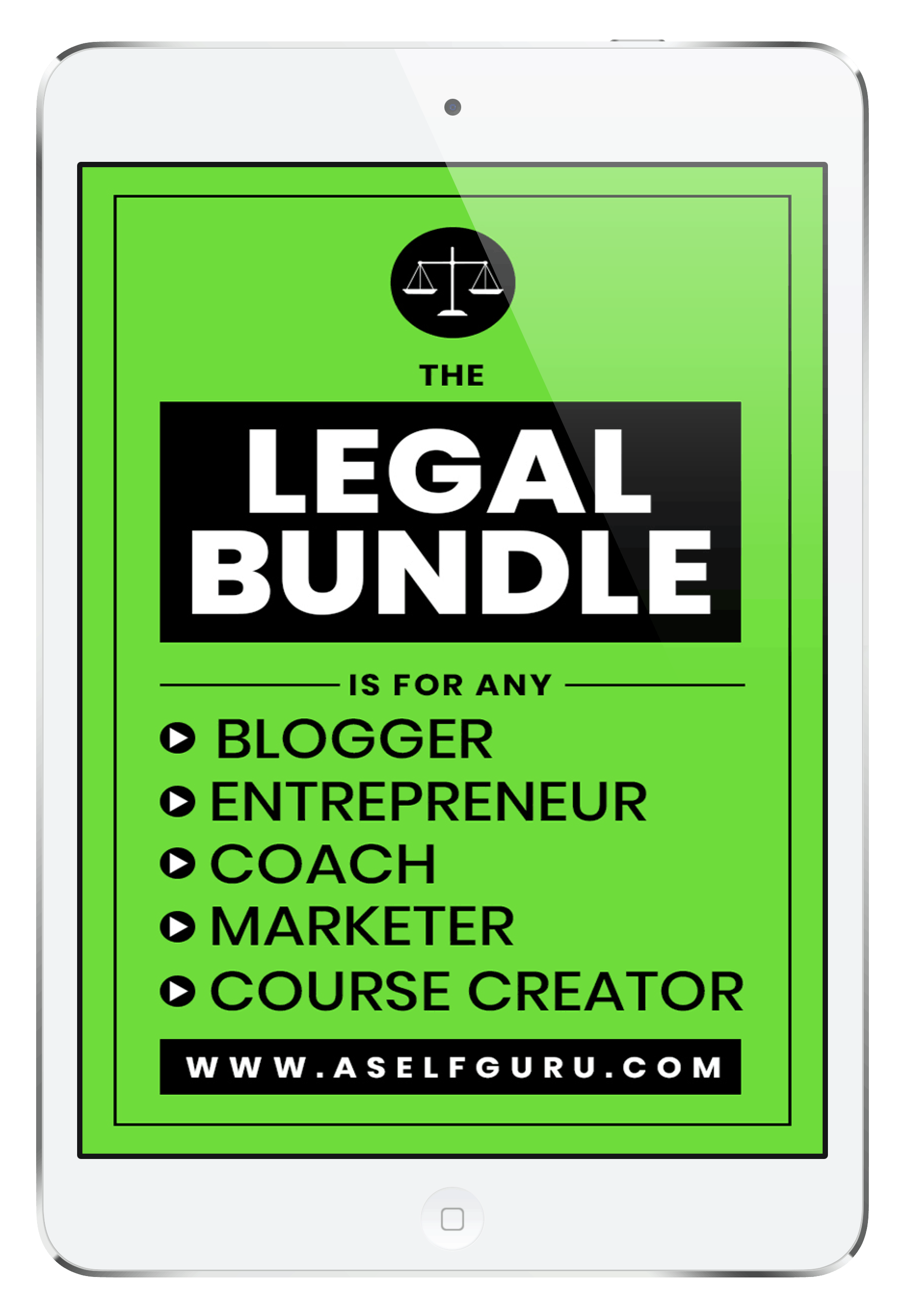
To make your life easy and not to overwhelm you with the legalese, I sell a Legal Bundle for your website, which is specifically tailored to bloggers and online entrepreneurs.
It includes ALL the legal pages you need on your blog.
This is the only Legal Bundle (my 3 Best-Selling legal templates + bonuses) you need to comply with the law and to protect your blog and online business legally.
It comes with a Privacy Policy template, Disclaimer template (including the Disclosures you need) and Terms and Conditions template for your website + 3 bonuses with each template.
You can watch and read the awesome testimonials of the Legal Bundle to see how easily and quickly you can customize these templates and then have peace of mind knowing your blog is now legally compliant!
About the Author:
Amira is a lawyer, blogger and business coach from Florida. She blogs at ASelfGuru.com where she teaches you how to protect your online business legally along with the business skills you need to become your own boss.




